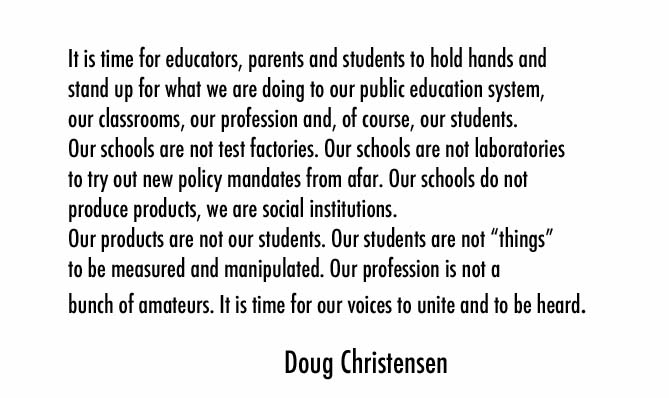Doug Christensen on ESEA: Time for the Voices of Educators, Parents and Students to be Heard

By Anthony Cody.
I first heard of Doug Christensen back in 2008, when he was still serving as Commissioner of Education in Nebraska. He was forced to resign because the locally-based assessment system he had developed there did not meet the mandates of No Child Left Behind — as described in this interview here. I connected with Christensen again a couple of years later, and we discussed the importance of local initiative and self determination. This week, I caught up with him again, as he has been on Capitol Hill, sharing his views with lawmakers wrestling with the reauthorization of ESEA. Here is what he has to say.
- What are you telling our representatives in Congress this week in regards to ESEA?
Doug Christensen: I support the notion that it is time for our federal government to reduce its “footprint” in the business of states. The constitution of each state clearly provides for and is responsible for the education of the youngest of each state’s people. It is not the role of the federal government. The role of federal government is to incentivize things like CTE, high poverty programs, safe and drug free schools and out-of-school learning centers.
Of course, this brings up the caveat so often cited that “if you are going to accept federal monies, you need to be accountable for it.” First, there is no such thing as “federal money.” The money with which the federal government has been entrusted belongs to the citizens and taxpayers in the states. Second, the federal government can not be a proxy for the citizens and taxpayers of any state. The accountability for the use of any public funding is back to the people who pay, i.e., local taxpayers. Federal accountability has too long displaced state and federal accountability. Third, of course states need to be accountable for their intentions in terms of what they will do with the monies received from federal grants and then be accountable for spending it for the purposes it is intended to serve. Beyond that, the accountability is back to the taxpayers of the state for the results in terms of student learning.
The best way for the federal government to reduce the footprint is to back up the testing requirement to grades 4-8-11 and let the states fill in the other grades with state or locally-determined assessment systems. As long as the requirement remains for every grade testing, there is no space for states and school districts to implement strategies designed to create more and better opportunities to learn for each child because that space is taken up by test prep, test taking and reporting. We can do better with our time and monies.
- How has your experience in Nebraska shaped your perspective on standardized tests?
Doug Christensen: More than ever, I am convinced of the harm being done by standardized testing. All of the research confirms that standardized tests measure advantage and not learning. And, they measure content recall, not application or higher order learning skills. So much of the test prep time is reserved for going over and over content pieces so that students can recall them…….not learn them.
I am also convinced that if we do not bring assessment out of the curriculum and instruction of the classroom (rather than out of the standards), we will never really know what and how well students are learning. Assessment should never be an end of instruction. When it is, using the data is a “forensic” activity while assessment that is embedded in instruction is “anthropomorphic” and useful while instruction is going on. The classroom teacher is the person who is with the students as they are learning (anthropomorphic) and they need data but the kind that verifies their judgments about who is learning, what are they learning, who is not learning and what is it they are not learning. No standardized test can answer those questions, only Doug Christensen on ESEA: Time for the Voices of Educators, Parents and Students to be Heard - Living in Dialogue:
|


